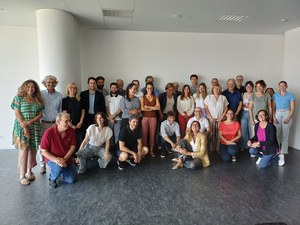First meeting of the steering committee
On Thursday, July 4, the project steering committee was held in Livorno at ISPRA headquarters. The day was dedicated to presenting the status of the activities envisaged by the project in its
different components, with a focus on the first phases that have been initiated in recent months. For the first component coordinated by ISPRA, work is being done on the collection and analysis of published and ongoing studies directed at estimating the impacts of climate change on the physical and geomorphological environment of the beach system, with reference to the geographical areas involved. Timelines were also set for the delivery of contributions that will make up the first product, due out in May 2025. The activities that are intended to be initiated in the various pilot sites were then reviewed, according to the provisions of Component 2, i.e., the one that concerns the implementation of pilot actions focused on Nature Based Solutions for increasing the resilience of the beach system (experiments, monitoring, simulations) including banquette management (formed by beached Posidonia), natural restoration and dune reprofiling. Cases of all 5 pilot areas where different solutions for a dune-beach-banquette system management will be tested and evaluated were presented. From Corsica to Sardinia, from Marseille to Liguria and Tuscany, each place has unique characteristics that require specific approaches. Among other scientific-technical actions, the work of oceanographic modelling, carried out by the
CNR- IAS of Sardinia and IBF of Pisa, was presented. The Universities of Pisa and Florence illustrated opportunities for monitoring Posidonia banquettes using drones. Measurement
campaigns with both aerial and underwater drones are planned to map submerged seagrass beds of live Posidonia and beached banquettes on shorelines with aerial drones.
Third component of the project, the one dedicated to the involvement of all stakeholders, coordinated by Scuola Superiore Sant'Anna, which intends to involve different stakeholders in all
pilot areas to assess the acceptability of the proposed solutions, socioeconomic benefits and tools that can contribute to the resilience of the beach system by socioeconomic actors (tourists,
businesses, associations, etc.).

